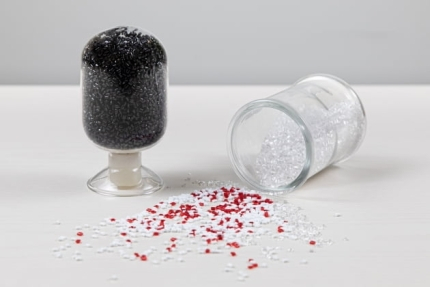Chemical Industry
Samyang develops polycarbonates made of 90% recycled plastic
The company also secured the highest grade in flame retardancy tests from UL, a US-based certifying agency
By Dec 28, 2022 (Gmt+09:00)
2
Min read
Most Read
Alibaba eyes 1st investment in Korean e-commerce platform


Blackstone signs over $1 bn deal with MBK for 1st exit in Korea


OCI to invest up to $1.5 bn in MalaysiaŌĆÖs polysilicon plant


Korea's Lotte Insurance put on market for around $1.5 bn


NPS loses $1.2 bn in local stocks in Q1 on weak battery shares



Polycarbonate, a transparent plastic that is heat- and impact-resistant, is mainly used in materials for cars and home appliances, soundproof walls and medical device parts. PCR PC is made through a compounding process that mixes a designated ratio of recycled and new polycarbonate raw materials.
The process requires a high degree of skill and expertise. In polycarbonate manufacturing, flame retardants, reinforcing agents and dyes are added to boost performance and aesthetic effects in addition to polymer synthetic resins, since such additives are deformed in the process of melting at high temperatures and the physical properties of polycarbonates are weakened.
As a result, up to 85% of the composition of PCR PC developed by domestic companies up to now comes from recycled polycarbonates, far higher than the 30% to 50% ratio in most such materials sold on the market.
Samyang Corp. developing PCR PC last year, and within two years made one comprising over 90% recycled PC raw materials but with natural properties such as heat resistance and transparency. The company attributed its progress to its polycarbonate development knowhow applied to the multi-angle redesign, and by optimizing the ratio of recycled raw materials and additives in the compounding process.
The company added that another huge plus was finding a supplier of high-quality recycled polycarbonate raw materials that controlled pollution and outside debris well.┬Ā
PCR PC is eco-friendly not only because it reduces plastic waste but also emits less CO2 emissions by consuming less energy. Samyang Corp. said its developed PCR PC will cut emissions by 6,200 tons based on 1,000 tons of production compared with general polycarbonates, a volume equal to the carbon emitted by some 3,200 cars.
The company, long recognized for its eco-friendly values, acquired the ECV certification from UL, an American safety standards certifying agency. The ECV green mark is awarded after verifying the validity of products' eco-friendly claims, such as the rate of reuse and recyclability. In addition, it met the standard of V-0, the highest grade in the vertical combustion evaluation UL 94, which is a flame retardancy test exclusively for plastics that self-extinguish within 10 seconds when lit vertically.
Samyang Corp. will first apply its new technology to small home appliances such as laptops, and then to electronics and interior products. It plans to apply PCR PC to plastic resins such as ABS and PBT as it continues expanding the scope of use.
"Few places in the world can produce PCR PC products made of over 90% recycled plastic materials with the same physical properties as conventional polycarbonates," said Samyang Corp. CEO Kang Ho-sung. "We will continue to diversify our high-quality eco-friendly products to meet global market demand, and contribute to raising our parent group's ESG (environment, social and governance) competitiveness."
Write to Kyung-Min Kang at kkm1026@hankyung.com
More to Read
-
 Samyang develops biodegradable plastic made of corn
Samyang develops biodegradable plastic made of cornJul 06, 2021 (Gmt+09:00)
1 Min read -
 Mergers & AcquisitionsSamyang joins bid to acquire US-based chemical maker Emerald Kalama
Mergers & AcquisitionsSamyang joins bid to acquire US-based chemical maker Emerald KalamaNov 01, 2020 (Gmt+09:00)
2 Min read
Comment 0
LOG IN


